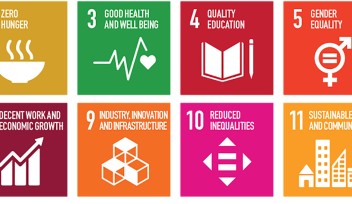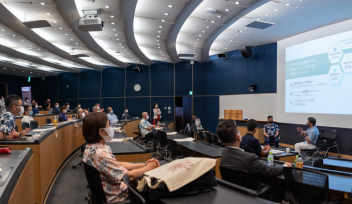Building Sustainable Cities and Communities: Insights from the Okinawa Sustainable City Summit 2022

Organized by Japan’s Purpose Driven Innovation (PDIE) Group in collaboration with the Okinawa Institute of Science and Technology (OIST), the online summit addressed a wide range of topics related to the development of sustainable, resilient, and self-sufficient small cities and communities.
In her opening remarks, Dr. Cecilia Lu, Director of OIST's SDG Initiative, highlighted the global nature of climate impact. "We are united in living the history of our lives. No one nowhere in the world can avoid the impact of climate change." Dr. Peter Gruss, then President and CEO of OIST, emphasized the role of innovation based on science, technology, and entrepreneurship to serve as the cornerstone for sustained growth and prosperity. "A future without sustainable development," he added, "might be a future without humans." Mr. Yoshiaki Ishii of the Japanese Ministry of Economy, Trade, and Industry (MEXT) highlighted the significance of the summit to foster an open dialogue and to facilitate local, national, and international collaborations that can pave the way towards a sustainable future. He emphasized that the summit was a unique opportunity for participants to exchange ideas and perspectives and to take collective action towards creating a common future that prioritizes sustainability. With registrations at capacity, the summit drew in participants from across the globe.
Metropolitan areas function as the epicenter for a range of social, economic, and quality-of-life concerns, primarily owing to their dense population and to the substantial resources they consume, including energy, housing, and water, while emitting large amounts of CO2 and other pollutants. Christian Schmitz, Founder of PDIE Group, outlined the summit's goals as aiming to create a sustainable ecosystem by promoting collaborative projects in key areas of renewable energy, agriculture, and circular economy. Speakers with wide-ranging expertise presented on topics relevant to the development of small cities and communities, encompassing everything from the social and ethical needs of smart cities to the management of everyday necessities for food and transport.
To foster active participation, breakout sessions were organized in which participants came together in small groups to explore ideas and work out the intricacies of selected topics. The summit was supported by OIST’s rapidly expanding SDG Initiative, established in 2021, the initiative works to integrate OIST's research and education pursuits into practical solutions for achieving the UN SDGs.
The first day of the two-day summit focussed on connecting and scanning the current landscape through presentations on some of the broader issues such as wellbeing and its importance in our cities. Malka Older, an acclaimed science fiction author and a faculty member at Arizona State University, delivered a thought-provoking address on “speculative resistance,” highlighting how our shared belief in an impending doomed future stops us from pursuing change. Other speakers took the opportunity to showcase blueprints for several city development projects that are in the making. Takehiko Nagumo presented Japan’s Digital Garden City Initiative, which aims to use digital technology to improve a city’s social indicators. And outside Japan, in the Netherlands, Brazil and Vietnam, Tom Bosschaert of Orchid City presented the blueprint for a self-sustaining and resilient city where residential communities with sustainable infrastructure, food production, water system, and energy management are built for people to live in harmony with nature. This way of harmonious living with the natural environment is an attractive feature and in high demand, enlivening the KoDorf movement or the community villages of future Germany for the young generation. During panel discussions, Joerg Geier, Dr. Fabian Feutlinske, and Frederik Fischer analyzed key elements that foster successful urban collaboration and co-creation. Lastly, Takashi Sabetto discussed the vacant house problem in Japan, commonly known as “Akiya.” He highlighted the work of his company, ADDress, and how it is dealing with this pressing issue by effectively utilizing unused properties throughout Japan and at the same time fostering meaningful connections among people.
On day two of the summit, participants were asked to focus and act, shifting from imagining the ideal future to finding ways to bring it to life. It began with discussions on the future of food and then delved into the use of agroforestry to help restore a healthy climate. Valter Ziantoni discussed the Pretaterra Project, which focuses on enhancing land health and productivity using agroforestry. Through careful analyses and planning, the project works to restore and manage land health. Furthermore, it provides an opportunity for farmers and professionals to learn about agroforestry and develop innovative ideas and technologies to create resilient systems. Sara Roversi, founder and president of the global social enterprise, Future Food Institute in Italy, discussed the "Pollica 2050 - Mediterranean Living" initiative. By concentrating on the Mediterranean Diet, the project has established a framework for creating a self-sustaining ecosystem that can regenerate itself for long-term sustainability. Stephan Nicoleau and Phil Dillard, entrepreneurs, and investors, then discussed the essential business models required for constructing a sustainable infrastructure. Lastly, Bjorn van Haver introduced his company, Elugie, which supplies clean electricity across Europe while promoting energy independence.
Overall. the summit was characterized by a spirit of productivity and collaboration, and gave attendees the chance to gain insight and expertise from diverse perspectives in sustainable city development projects from across the world.














